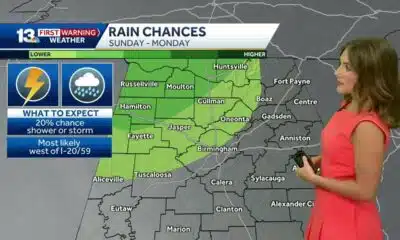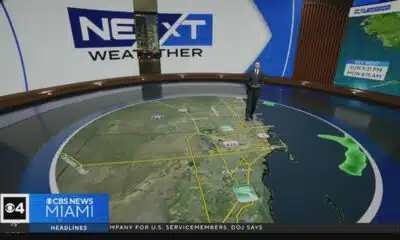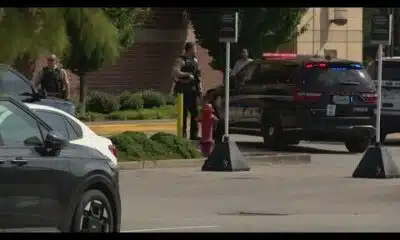News from the South - North Carolina News Feed
City officials attended meetings where NCDOT revealed I-26 flyover plan • Asheville Watchdog
High-ranking Asheville officials, including two assistant city managers and at least one City Council member, likely knew as early as last spring about the state’s decision to revive plans for a controversial overpass above Patton Avenue as part of the I-26 Connector project, according to meeting records obtained by Asheville Watchdog and interviews with people who attended those meetings.
But several Asheville City Council members said they and the public were left in the dark about the plan, despite more than a dozen discussions the North Carolina Department of Transportation held with staffers and other local stakeholders between early 2024 and January 2025.
They learned about it only after a presentation from the NCDOT at a Feb. 11 City Council meeting. Renderings shown during the meeting subtly revealed that the overpass had returned to the plans, which previously called for I-26 to run under Patton.
State Sen. Julie Mayfield, D-Buncombe, and French Broad River Metropolitan Planning Organization Director Tristan Winkler each said in interviews that they recalled the NCDOT referencing the overpass in meetings they attended last year.
Each attended three meetings last spring and summer, according to information the city provided in response to a Watchdog request. Others in attendance included assistant city managers Rachel Wood and Ben Woody; Jessica Morriss, the city’s assistant director of transportation; and City Council member Maggie Ullman.
“I-26 is needed to reduce traffic and improve quality of life for the community,” Ullman said via text message. “In my advocacy for improved transportation, DOT has explained (cost) cutting is needed for this project to move forward. I’m glad other key elements the community advocated for remain intact, but (I) am disappointed such a major decision was made unilaterally by the DOT.”

Ullman did not answer questions about her knowledge of the flyover plan and why, if she had information about it, she didn’t share it with other Council members or the public.
The Watchdog reached out to Wood and Woody for comment but did not receive responses.
The city has no agendas or minutes for those meetings, spokesperson Kim Miller said. According to a statement Miller provided from the city’s transportation department, city officials learned about the overpass design after the NCDOT selected a bidder, Archer-Wright Joint Venture, and began its “optimization and refinement” process to find ways to further cut costs.
Though Archer-Wright was publicly announced as the winning bidder on May 15, city records show the first optimization and refinement meeting took place 12 days earlier, with Ullman, Wood, Woody, and Morriss all in attendance.
‘I was not contacted’: Council members respond
Several Council members said they were blindsided by news of the flyover.
“I’m alarmed we are seeing a different plan move forward that was previously eliminated,” Council Member Sage Turner said. “The update came to Council as a presentation under the City Manager’s report with little notice and no details on this enormous change.”

The NCDOT made a presentation to council at its Feb. 11 meeting that briefly showed the eight-lane I-26 overpass on Patton Avenue, but city and state officials did not comment on it until The Watchdog first reported on the change on Feb. 14. The flyover design was dropped after it generated a backlash among city and county officials and stakeholders in 2008, with plans shifting to a design that carried I-26 beneath Patton Avenue near the Capt. Jeff Bowen bridge on the west side of the French Broad River.
“If they wanted or needed Council’s input as they made these big changes, they didn’t follow any procedures to do so,” Turner said via text message. “I was not contacted. Nor was I asked to vote on or support the changes. And while it’s great NCDOT has been able to eliminate large retaining walls and implement significant cost savings, why were these cost saving measures not on the table before? Will they return in a couple years with more changes after materials have gone up another 30 percent? Where’s the accountability to community, process, and budgets?”
In a Facebook post last week, Council Member Kim Roney, a multimodal transportation advocate, expressed frustration and noted that “some Council members and regional electeds were invited to review the design including flyover change last summer.” She wrote that she’s asked to be invited to all such meetings in the future. Roney did not respond to requests for comment.
Asheville Mayor Esther Manheimer offered praise to the NCDOT for pedestrian- and resident-friendly elements that remained in the plan, but she, too, said her first notification of the flyover bridge came in the Feb. 11 council meeting.

“While I am disappointed in the NCDOT’s reinstatement of the Patton Avenue flyover bridge, which council learned about at the last council meeting when DOT presented council with the revisions to the project, I am glad that many of the elements that Asheville fought for remain in the project such as the reduced footprint, the additional protections for Burton Street and Montford, bike and pedestrian infrastructure connecting West Asheville to downtown, and the aesthetic features recommended by the Aesthetics Committee,” Manheimer said in an emailed statement.
Council members Antanette Mosley, Sheneika Smith, and Bo Hess — the latter of whom joined council in December — did not respond to multiple requests for comment.
“While the City understands community concerns regarding the Patton Avenue/I-26 flyover design change, the NCDOT has committed to continuing to work with the City on the bridge’s design and aesthetic components,” the city said in its statement. “NCDOT is currently working to develop visual illustrations of the design change and plans to hold a public information session in the coming weeks.”
Chris Cooper, a political scientist at Western Carolina University, said the manner in which the flyover plan became public seems opaque.
“At the very least, I’d say this is not a good look for the city,” Cooper said. “This has been perhaps the most prominent transportation issue — not just in the city of Asheville, but in western North Carolina — for the last decade, and for something that had been ruled out to be presented in the final plan doesn’t exactly scream transparency.”
Cooper said elected officials have a duty to keep the public informed, as “people don’t vote for the DOT.
That responsibility is crucial “especially on a project that will affect transportation patterns, development, housing, the environment,” Cooper said. “Almost every major issue that affects the city is going to be touched by this project.”
The idea for an overpass above Patton Avenue was first proposed in 2008, but the NCDOT nixed it after protests from the city, Buncombe County, and the Asheville Design Center, a nonprofit that worked on designs that would eventually be incorporated into the project.
They argued that a bridge over Patton would hamper the development of the street into a pedestrian- and cyclist-friendly gateway between West Asheville and downtown. When the Connector project went through a public hearing process in late 2018, it included designs calling for the interstate to run under Patton.
The revival of the flyover came in 2023, during a pre-bid process in which prospective contractors could ask the NCDOT for permission to make substantial design changes. The agency approved Archer-Wright’s request in July of that year. Though the NCDOT docked Archer-Wright points on the technical score it uses to evaluate proposals — it came in second of the three bidders — the agency said the cost savings of putting the interstate over Patton made Archer-Wright’s $1.15 billion pitch the cheapest.
Neither of the other bidders, Balfour Beatty Infrastructure and Flatiron-United-BDC Joint Venture, proposed a flyover. Neither responded to multiple requests for comment for this story.
Archer-Wright has not publicly commented on the flyover design, and it did not respond to questions from The Watchdog this week. But public records show that when the contractor first proposed the design change, it downplayed potential cost savings. It instead pitched the overpass as being easier and safer to build than an underpass — it would take four phases instead of nine, involve less disruption of utility lines, and require fewer temporary traffic pattern changes on Patton.
While the NCDOT would save on long-term maintenance with the flyover and on utilities costs, an Archer-Wright engineer wrote in 2023, “no significant changes are anticipated for infrastructure costs.” Under a heading titled “Construction Cost,” he wrote “unchanged.”
In the nine months since Archer-Wright won the bid, the NCDOT has not published the contractor’s proposal on its website. The Watchdog obtained it through a public records request. Earlier this month, the agency said it had delayed publication because it expected the proposal to change significantly during the cost-cutting process.
West Asheville resident Brooke Heaton, an activist and avid cyclist, said the reemergence of the flyover — and the lack of transparency about it — is “really deeply disheartening.”
Return of the flyover, lack of transparency ‘beyond disheartening’
“It’s certainly beyond disheartening, because my understanding was there was a lot of community outreach and input that has been taking place for years on this,” Heaton said. “And so to push back on that is, I think, a pretty big break of trust between the residents of Asheville and DOT.”
Heaton says he cycles downtown multiple times a week from West Asheville and was looking forward to Patton Avenue and the Jeff Bowen Bridge becoming more pedestrian- and bike-friendly.
“I don’t know that riding under an eight-lane interstate highway makes it any more pedestrian-friendly,” Heaton said. “So it’s not really the type of city I was looking forward to living in for the rest of my life, having that massive interstate fly over that point.”
Because the flyover proposal will save money on the total project cost, Heaton doubts the community will be able to change the NCDOT’s mind. Heaton also said he doubts that a lot of people are aware of the change, despite recent news coverage.
“I don’t really know that you’re going to see much of an uprising locally about this, just because I think a lot of people are going to feel pretty powerless to change that, considering how much they’re trying to save,” Heaton said. “I think it’s going to be a permanent change for the city for generations, and that’s something we’re going to have to live with.”
Asheville Watchdog is a nonprofit news team producing stories that matter to Asheville and Buncombe County. Jack Evans is an investigative reporter who previously worked at the Tampa Bay Times. You can reach him via email at jevans@avlwatchdog.org. John Boyle has been covering Asheville and surrounding communities since the 20th century. You can reach him at (828) 337-0941, or via email at jboyle@avlwatchdog.org. The Watchdog’s local reporting during this crisis is made possible by donations from the community. To show your support for this vital public service go to avlwatchdog.org/support-our-publication/.
Related
The post City officials attended meetings where NCDOT revealed I-26 flyover plan • Asheville Watchdog appeared first on avlwatchdog.org
News from the South - North Carolina News Feed
Family, friends hold candlelight vigil in honor of Giovanni Pelletier
SUMMARY: Family and friends held a candlelight vigil in Apex to honor Giovanni Pelletier, a Fuquay Varina High School graduate whose body was found last month in a Florida retention pond. Giovanni went missing while visiting family, after reportedly acting erratically and leaving his cousins’ car. Loved ones remembered his infectious smile, laughter, and loyal friendship, expressing how deeply he impacted their lives. His mother shared the family’s ongoing grief and search for answers as authorities continue investigating his death. Despite the sadness, the community’s support has provided comfort. A celebration of life mass is planned in Apex to further commemorate Giovanni’s memory.
“It’s good to know how loved someone is in their community.”
More: https://abc11.com/post/giovanni-pelletier-family-friends-hold-candlelight-vigil-honor-wake-teen-found-dead-florida/17811995/
Download: https://abc11.com/apps/
Like us on Facebook: https://www.facebook.com/ABC11/
Instagram: https://www.instagram.com/abc11_wtvd/
Threads: https://www.threads.net/@abc11_wtvd
TIKTOK: https://www.tiktok.com/@abc11_eyewitnessnews
News from the South - North Carolina News Feed
NC Courage wins 2-1 against Angel City FC
SUMMARY: The North Carolina Courage defeated Angel City FC 2-1 in Cary, ending their unbeaten streak. Monaca scored early at the 6th minute, followed by Bull City native Brianna Pinto’s goal at the 18th minute, securing a 2-0 halftime lead. Angel City intensified in the second half, scoring in the 88th minute, but the Courage held firm defensively to claim victory. Pinto expressed pride in the win, emphasizing the team’s unity and playoff ambitions. Nearly 8,000 fans attended. Coverage continues tonight at 11, alongside college football updates, including the Tar Heels vs. Richmond game live from Chapel Hill.
Saturday’s win was crucial for the Courage as the regular season starts to wind down.
https://abc11.com/post/north-carolina-courage-wins-2-1-angel-city-fc/17810234/
Download: https://abc11.com/apps/
Like us on Facebook: https://www.facebook.com/ABC11/
Instagram: https://www.instagram.com/abc11_wtvd/
Threads: https://www.threads.net/@abc11_wtvd
TIKTOK: https://www.tiktok.com/@abc11_eyewitnessnews
News from the South - North Carolina News Feed
Is nail gel actually harmful? It's complicated
SUMMARY: Gel nail polishes were recently banned in the EU due to the chemical TPO, which helps the gel harden under UV light. Concerns stem from studies showing potential reproductive risks in rats fed TPO, but humans aren’t exposed this way. The margin of exposure calculated for TPO is very high (1,515), suggesting it’s safe for people. More significant risks come from UV light used to cure nails, which may contribute to skin cancer over time. To stay safe, consider applying sunscreen before your salon visit and discuss toxin-free polish options with your aesthetician. Ultimately, balanced caution is key.
Certain gel nail polishes are no longer widespread in Europe as a chemical was banned due to potential health risks with long-term exposure. But a closer look at the study prompts some questions.
-
News from the South - West Virginia News Feed7 days ago
Protesters in D.C. flood the streets demanding an end to Trump’s military deployment
-
News from the South - Virginia News Feed7 days ago
On the record: Winsome Earle-Sears
-
News from the South - Missouri News Feed6 days ago
1587 Prime gives first look at food, cocktail menu ahead of grand opening in KC
-
News from the South - Arkansas News Feed6 days ago
‘One Pill Can Kill’ program aims to reduce opioid drug overdose
-
Mississippi News Video7 days ago
Interview: Come see Baptist at WTVA Senior Health Fair
-
News from the South - Alabama News Feed6 days ago
Alabama lawmaker revives bill to allow chaplains in public schools
-
News from the South - Arkansas News Feed6 days ago
Arkansas’s morning headlines | Sept. 9, 2025
-
The Conversation7 days ago
How is paint made?











































